Capital Punishment: Ethical Debate
VerifiedAdded on 2020/05/04
|9
|2918
|80
AI Summary
This assignment delves into the complex ethical issues surrounding capital punishment. Students are tasked with examining both sides of the argument, weighing factors such as human rights, deterrence, and the potential for wrongful execution. The goal is to critically analyze the presented viewpoints and form a well-reasoned conclusion on the validity of arguments for and against capital punishment.
Contribute Materials
Your contribution can guide someone’s learning journey. Share your
documents today.
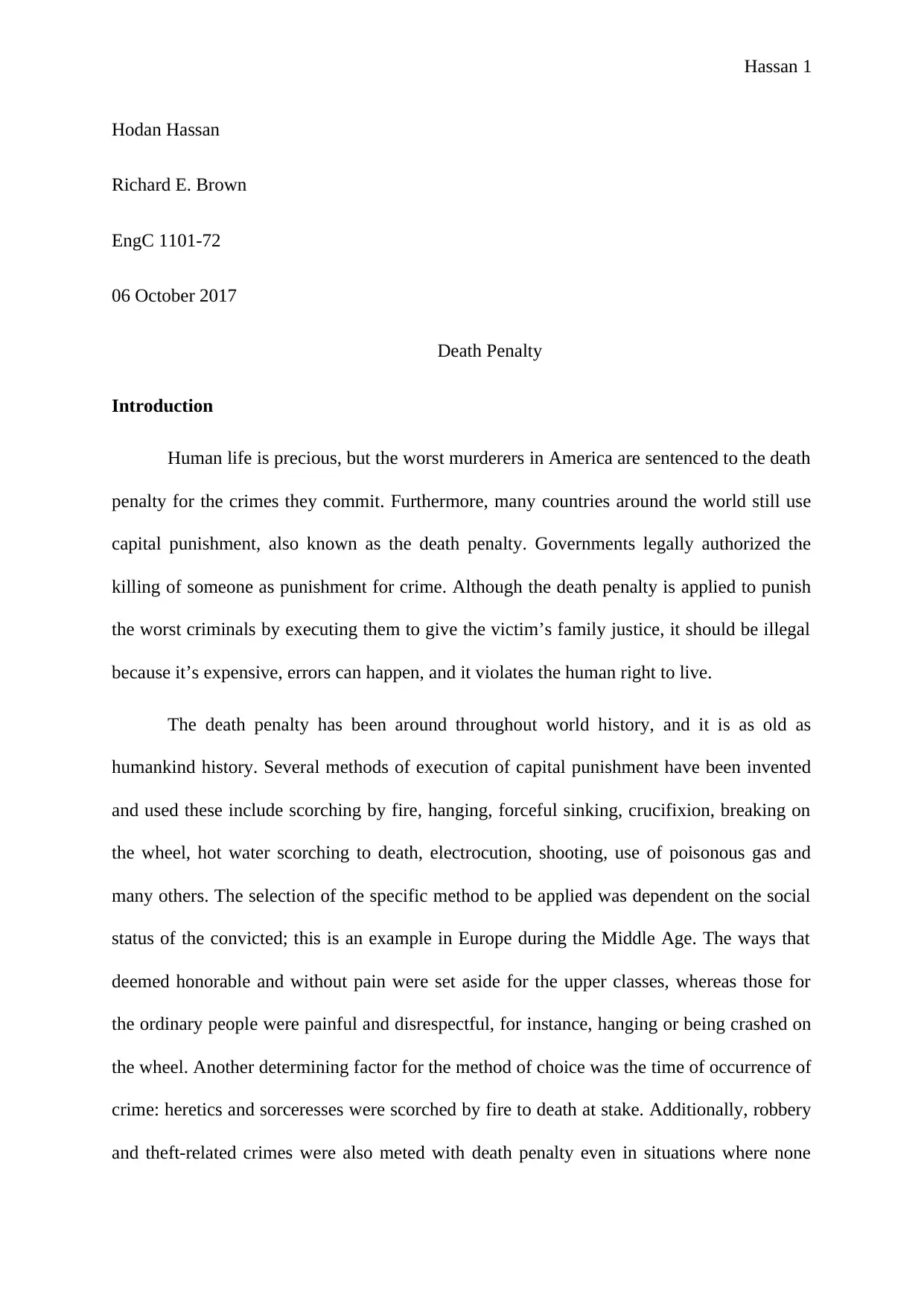
Hassan 1
Hodan Hassan
Richard E. Brown
EngC 1101-72
06 October 2017
Death Penalty
Introduction
Human life is precious, but the worst murderers in America are sentenced to the death
penalty for the crimes they commit. Furthermore, many countries around the world still use
capital punishment, also known as the death penalty. Governments legally authorized the
killing of someone as punishment for crime. Although the death penalty is applied to punish
the worst criminals by executing them to give the victim’s family justice, it should be illegal
because it’s expensive, errors can happen, and it violates the human right to live.
The death penalty has been around throughout world history, and it is as old as
humankind history. Several methods of execution of capital punishment have been invented
and used these include scorching by fire, hanging, forceful sinking, crucifixion, breaking on
the wheel, hot water scorching to death, electrocution, shooting, use of poisonous gas and
many others. The selection of the specific method to be applied was dependent on the social
status of the convicted; this is an example in Europe during the Middle Age. The ways that
deemed honorable and without pain were set aside for the upper classes, whereas those for
the ordinary people were painful and disrespectful, for instance, hanging or being crashed on
the wheel. Another determining factor for the method of choice was the time of occurrence of
crime: heretics and sorceresses were scorched by fire to death at stake. Additionally, robbery
and theft-related crimes were also meted with death penalty even in situations where none
Hodan Hassan
Richard E. Brown
EngC 1101-72
06 October 2017
Death Penalty
Introduction
Human life is precious, but the worst murderers in America are sentenced to the death
penalty for the crimes they commit. Furthermore, many countries around the world still use
capital punishment, also known as the death penalty. Governments legally authorized the
killing of someone as punishment for crime. Although the death penalty is applied to punish
the worst criminals by executing them to give the victim’s family justice, it should be illegal
because it’s expensive, errors can happen, and it violates the human right to live.
The death penalty has been around throughout world history, and it is as old as
humankind history. Several methods of execution of capital punishment have been invented
and used these include scorching by fire, hanging, forceful sinking, crucifixion, breaking on
the wheel, hot water scorching to death, electrocution, shooting, use of poisonous gas and
many others. The selection of the specific method to be applied was dependent on the social
status of the convicted; this is an example in Europe during the Middle Age. The ways that
deemed honorable and without pain were set aside for the upper classes, whereas those for
the ordinary people were painful and disrespectful, for instance, hanging or being crashed on
the wheel. Another determining factor for the method of choice was the time of occurrence of
crime: heretics and sorceresses were scorched by fire to death at stake. Additionally, robbery
and theft-related crimes were also meted with death penalty even in situations where none
Secure Best Marks with AI Grader
Need help grading? Try our AI Grader for instant feedback on your assignments.
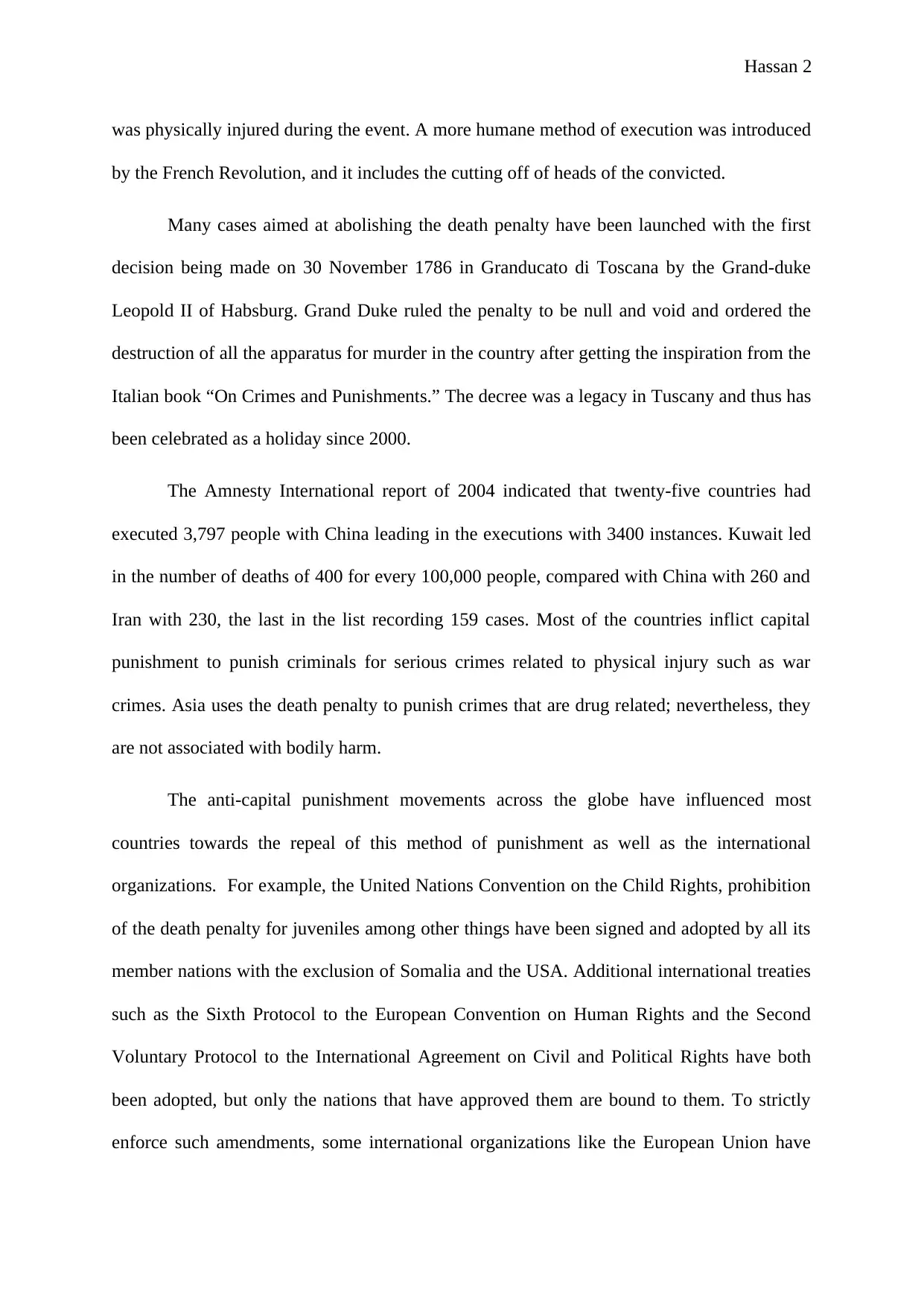
Hassan 2
was physically injured during the event. A more humane method of execution was introduced
by the French Revolution, and it includes the cutting off of heads of the convicted.
Many cases aimed at abolishing the death penalty have been launched with the first
decision being made on 30 November 1786 in Granducato di Toscana by the Grand-duke
Leopold II of Habsburg. Grand Duke ruled the penalty to be null and void and ordered the
destruction of all the apparatus for murder in the country after getting the inspiration from the
Italian book “On Crimes and Punishments.” The decree was a legacy in Tuscany and thus has
been celebrated as a holiday since 2000.
The Amnesty International report of 2004 indicated that twenty-five countries had
executed 3,797 people with China leading in the executions with 3400 instances. Kuwait led
in the number of deaths of 400 for every 100,000 people, compared with China with 260 and
Iran with 230, the last in the list recording 159 cases. Most of the countries inflict capital
punishment to punish criminals for serious crimes related to physical injury such as war
crimes. Asia uses the death penalty to punish crimes that are drug related; nevertheless, they
are not associated with bodily harm.
The anti-capital punishment movements across the globe have influenced most
countries towards the repeal of this method of punishment as well as the international
organizations. For example, the United Nations Convention on the Child Rights, prohibition
of the death penalty for juveniles among other things have been signed and adopted by all its
member nations with the exclusion of Somalia and the USA. Additional international treaties
such as the Sixth Protocol to the European Convention on Human Rights and the Second
Voluntary Protocol to the International Agreement on Civil and Political Rights have both
been adopted, but only the nations that have approved them are bound to them. To strictly
enforce such amendments, some international organizations like the European Union have
was physically injured during the event. A more humane method of execution was introduced
by the French Revolution, and it includes the cutting off of heads of the convicted.
Many cases aimed at abolishing the death penalty have been launched with the first
decision being made on 30 November 1786 in Granducato di Toscana by the Grand-duke
Leopold II of Habsburg. Grand Duke ruled the penalty to be null and void and ordered the
destruction of all the apparatus for murder in the country after getting the inspiration from the
Italian book “On Crimes and Punishments.” The decree was a legacy in Tuscany and thus has
been celebrated as a holiday since 2000.
The Amnesty International report of 2004 indicated that twenty-five countries had
executed 3,797 people with China leading in the executions with 3400 instances. Kuwait led
in the number of deaths of 400 for every 100,000 people, compared with China with 260 and
Iran with 230, the last in the list recording 159 cases. Most of the countries inflict capital
punishment to punish criminals for serious crimes related to physical injury such as war
crimes. Asia uses the death penalty to punish crimes that are drug related; nevertheless, they
are not associated with bodily harm.
The anti-capital punishment movements across the globe have influenced most
countries towards the repeal of this method of punishment as well as the international
organizations. For example, the United Nations Convention on the Child Rights, prohibition
of the death penalty for juveniles among other things have been signed and adopted by all its
member nations with the exclusion of Somalia and the USA. Additional international treaties
such as the Sixth Protocol to the European Convention on Human Rights and the Second
Voluntary Protocol to the International Agreement on Civil and Political Rights have both
been adopted, but only the nations that have approved them are bound to them. To strictly
enforce such amendments, some international organizations like the European Union have
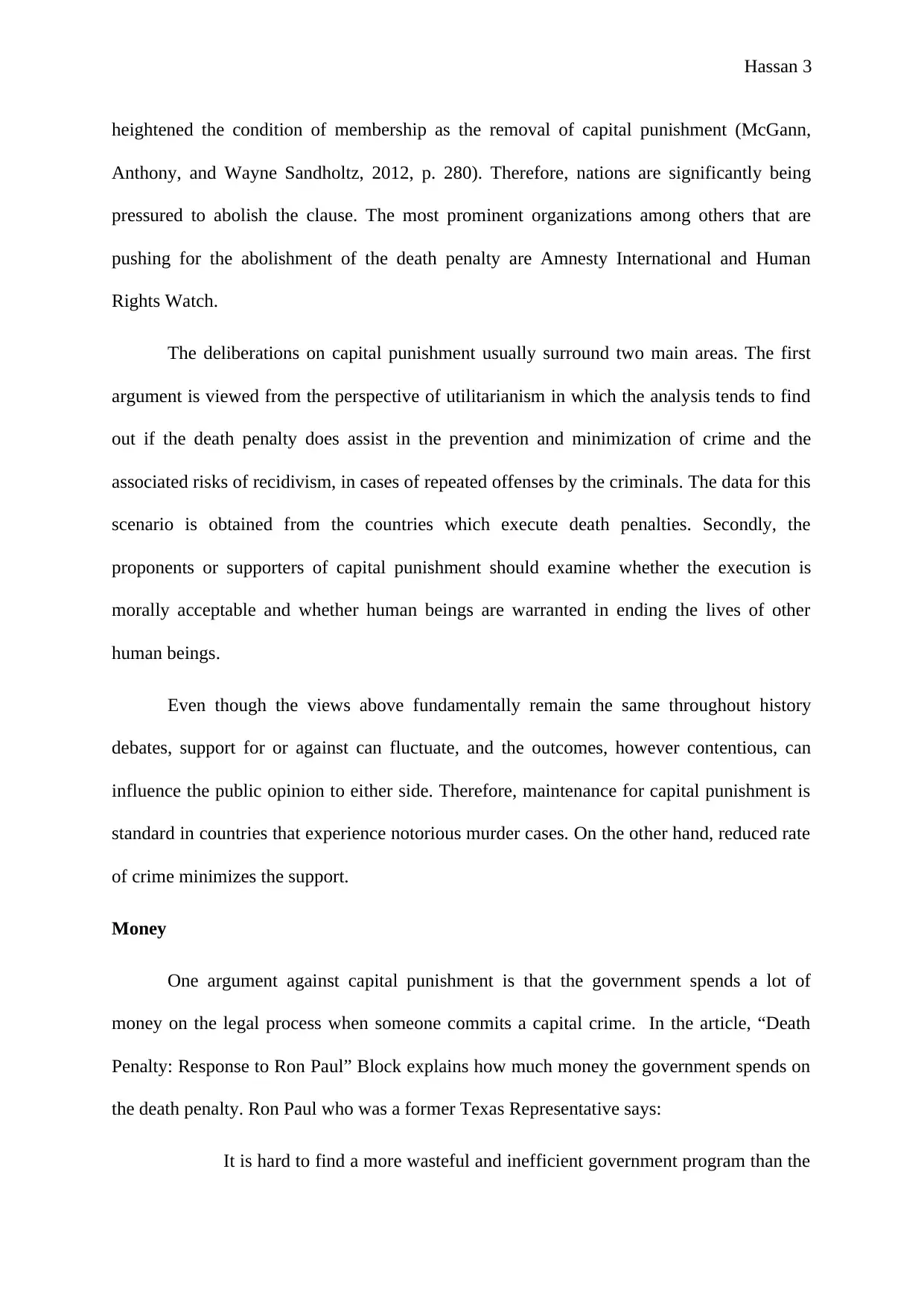
Hassan 3
heightened the condition of membership as the removal of capital punishment (McGann,
Anthony, and Wayne Sandholtz, 2012, p. 280). Therefore, nations are significantly being
pressured to abolish the clause. The most prominent organizations among others that are
pushing for the abolishment of the death penalty are Amnesty International and Human
Rights Watch.
The deliberations on capital punishment usually surround two main areas. The first
argument is viewed from the perspective of utilitarianism in which the analysis tends to find
out if the death penalty does assist in the prevention and minimization of crime and the
associated risks of recidivism, in cases of repeated offenses by the criminals. The data for this
scenario is obtained from the countries which execute death penalties. Secondly, the
proponents or supporters of capital punishment should examine whether the execution is
morally acceptable and whether human beings are warranted in ending the lives of other
human beings.
Even though the views above fundamentally remain the same throughout history
debates, support for or against can fluctuate, and the outcomes, however contentious, can
influence the public opinion to either side. Therefore, maintenance for capital punishment is
standard in countries that experience notorious murder cases. On the other hand, reduced rate
of crime minimizes the support.
Money
One argument against capital punishment is that the government spends a lot of
money on the legal process when someone commits a capital crime. In the article, “Death
Penalty: Response to Ron Paul” Block explains how much money the government spends on
the death penalty. Ron Paul who was a former Texas Representative says:
It is hard to find a more wasteful and inefficient government program than the
heightened the condition of membership as the removal of capital punishment (McGann,
Anthony, and Wayne Sandholtz, 2012, p. 280). Therefore, nations are significantly being
pressured to abolish the clause. The most prominent organizations among others that are
pushing for the abolishment of the death penalty are Amnesty International and Human
Rights Watch.
The deliberations on capital punishment usually surround two main areas. The first
argument is viewed from the perspective of utilitarianism in which the analysis tends to find
out if the death penalty does assist in the prevention and minimization of crime and the
associated risks of recidivism, in cases of repeated offenses by the criminals. The data for this
scenario is obtained from the countries which execute death penalties. Secondly, the
proponents or supporters of capital punishment should examine whether the execution is
morally acceptable and whether human beings are warranted in ending the lives of other
human beings.
Even though the views above fundamentally remain the same throughout history
debates, support for or against can fluctuate, and the outcomes, however contentious, can
influence the public opinion to either side. Therefore, maintenance for capital punishment is
standard in countries that experience notorious murder cases. On the other hand, reduced rate
of crime minimizes the support.
Money
One argument against capital punishment is that the government spends a lot of
money on the legal process when someone commits a capital crime. In the article, “Death
Penalty: Response to Ron Paul” Block explains how much money the government spends on
the death penalty. Ron Paul who was a former Texas Representative says:
It is hard to find a more wasteful and inefficient government program than the
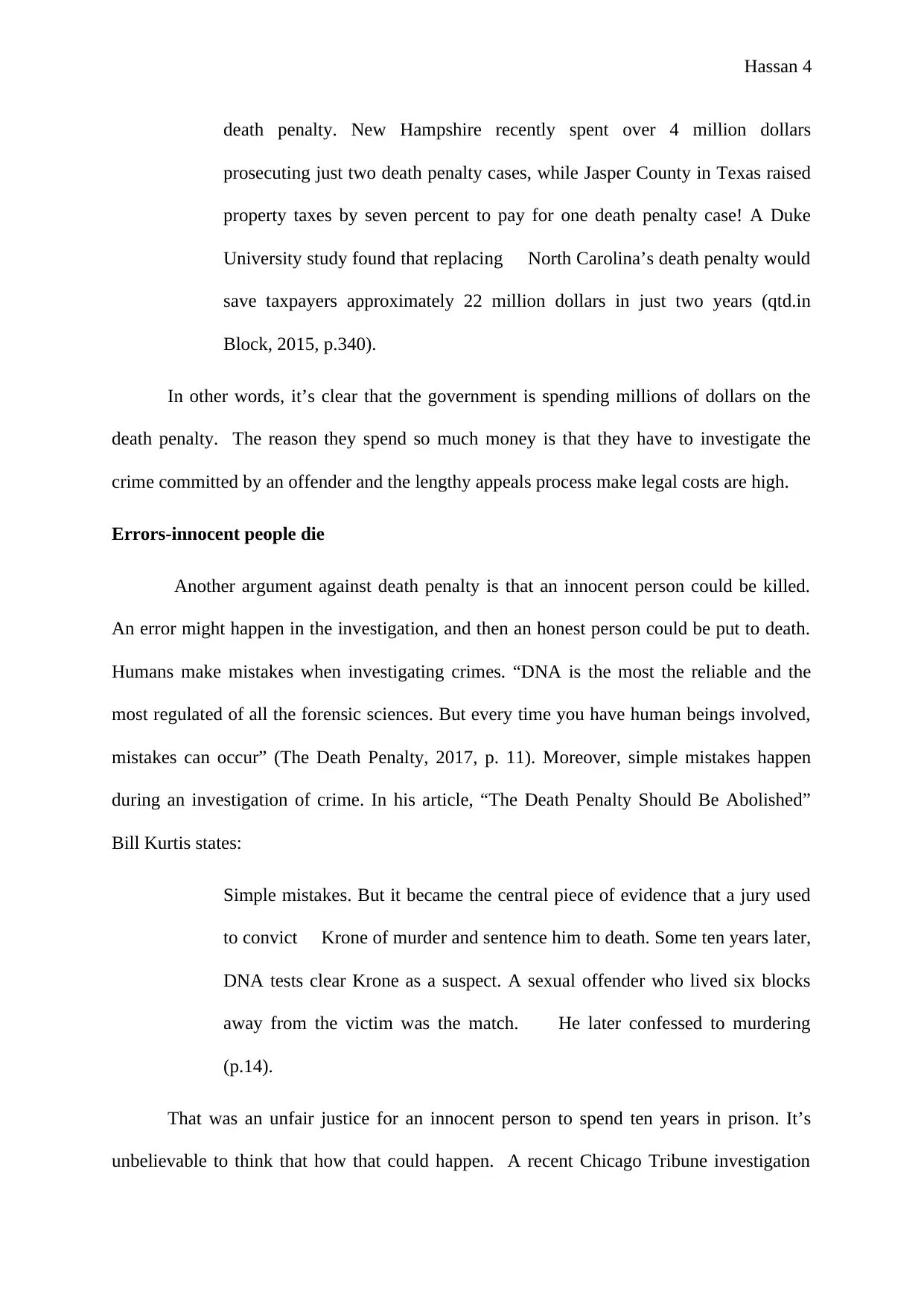
Hassan 4
death penalty. New Hampshire recently spent over 4 million dollars
prosecuting just two death penalty cases, while Jasper County in Texas raised
property taxes by seven percent to pay for one death penalty case! A Duke
University study found that replacing North Carolina’s death penalty would
save taxpayers approximately 22 million dollars in just two years (qtd.in
Block, 2015, p.340).
In other words, it’s clear that the government is spending millions of dollars on the
death penalty. The reason they spend so much money is that they have to investigate the
crime committed by an offender and the lengthy appeals process make legal costs are high.
Errors-innocent people die
Another argument against death penalty is that an innocent person could be killed.
An error might happen in the investigation, and then an honest person could be put to death.
Humans make mistakes when investigating crimes. “DNA is the most the reliable and the
most regulated of all the forensic sciences. But every time you have human beings involved,
mistakes can occur” (The Death Penalty, 2017, p. 11). Moreover, simple mistakes happen
during an investigation of crime. In his article, “The Death Penalty Should Be Abolished”
Bill Kurtis states:
Simple mistakes. But it became the central piece of evidence that a jury used
to convict Krone of murder and sentence him to death. Some ten years later,
DNA tests clear Krone as a suspect. A sexual offender who lived six blocks
away from the victim was the match. He later confessed to murdering
(p.14).
That was an unfair justice for an innocent person to spend ten years in prison. It’s
unbelievable to think that how that could happen. A recent Chicago Tribune investigation
death penalty. New Hampshire recently spent over 4 million dollars
prosecuting just two death penalty cases, while Jasper County in Texas raised
property taxes by seven percent to pay for one death penalty case! A Duke
University study found that replacing North Carolina’s death penalty would
save taxpayers approximately 22 million dollars in just two years (qtd.in
Block, 2015, p.340).
In other words, it’s clear that the government is spending millions of dollars on the
death penalty. The reason they spend so much money is that they have to investigate the
crime committed by an offender and the lengthy appeals process make legal costs are high.
Errors-innocent people die
Another argument against death penalty is that an innocent person could be killed.
An error might happen in the investigation, and then an honest person could be put to death.
Humans make mistakes when investigating crimes. “DNA is the most the reliable and the
most regulated of all the forensic sciences. But every time you have human beings involved,
mistakes can occur” (The Death Penalty, 2017, p. 11). Moreover, simple mistakes happen
during an investigation of crime. In his article, “The Death Penalty Should Be Abolished”
Bill Kurtis states:
Simple mistakes. But it became the central piece of evidence that a jury used
to convict Krone of murder and sentence him to death. Some ten years later,
DNA tests clear Krone as a suspect. A sexual offender who lived six blocks
away from the victim was the match. He later confessed to murdering
(p.14).
That was an unfair justice for an innocent person to spend ten years in prison. It’s
unbelievable to think that how that could happen. A recent Chicago Tribune investigation
Secure Best Marks with AI Grader
Need help grading? Try our AI Grader for instant feedback on your assignments.
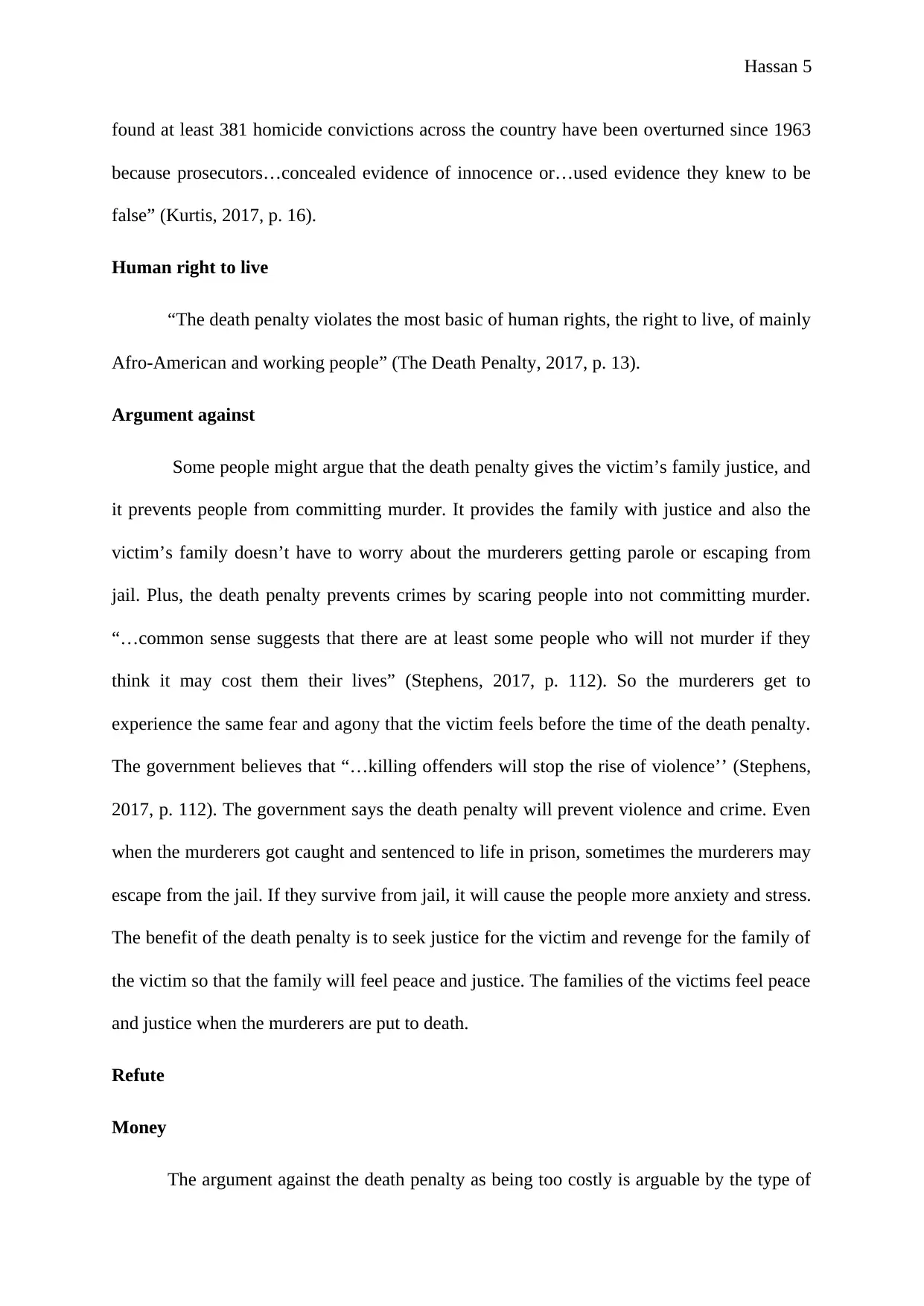
Hassan 5
found at least 381 homicide convictions across the country have been overturned since 1963
because prosecutors…concealed evidence of innocence or…used evidence they knew to be
false” (Kurtis, 2017, p. 16).
Human right to live
“The death penalty violates the most basic of human rights, the right to live, of mainly
Afro-American and working people” (The Death Penalty, 2017, p. 13).
Argument against
Some people might argue that the death penalty gives the victim’s family justice, and
it prevents people from committing murder. It provides the family with justice and also the
victim’s family doesn’t have to worry about the murderers getting parole or escaping from
jail. Plus, the death penalty prevents crimes by scaring people into not committing murder.
“…common sense suggests that there are at least some people who will not murder if they
think it may cost them their lives” (Stephens, 2017, p. 112). So the murderers get to
experience the same fear and agony that the victim feels before the time of the death penalty.
The government believes that “…killing offenders will stop the rise of violence’’ (Stephens,
2017, p. 112). The government says the death penalty will prevent violence and crime. Even
when the murderers got caught and sentenced to life in prison, sometimes the murderers may
escape from the jail. If they survive from jail, it will cause the people more anxiety and stress.
The benefit of the death penalty is to seek justice for the victim and revenge for the family of
the victim so that the family will feel peace and justice. The families of the victims feel peace
and justice when the murderers are put to death.
Refute
Money
The argument against the death penalty as being too costly is arguable by the type of
found at least 381 homicide convictions across the country have been overturned since 1963
because prosecutors…concealed evidence of innocence or…used evidence they knew to be
false” (Kurtis, 2017, p. 16).
Human right to live
“The death penalty violates the most basic of human rights, the right to live, of mainly
Afro-American and working people” (The Death Penalty, 2017, p. 13).
Argument against
Some people might argue that the death penalty gives the victim’s family justice, and
it prevents people from committing murder. It provides the family with justice and also the
victim’s family doesn’t have to worry about the murderers getting parole or escaping from
jail. Plus, the death penalty prevents crimes by scaring people into not committing murder.
“…common sense suggests that there are at least some people who will not murder if they
think it may cost them their lives” (Stephens, 2017, p. 112). So the murderers get to
experience the same fear and agony that the victim feels before the time of the death penalty.
The government believes that “…killing offenders will stop the rise of violence’’ (Stephens,
2017, p. 112). The government says the death penalty will prevent violence and crime. Even
when the murderers got caught and sentenced to life in prison, sometimes the murderers may
escape from the jail. If they survive from jail, it will cause the people more anxiety and stress.
The benefit of the death penalty is to seek justice for the victim and revenge for the family of
the victim so that the family will feel peace and justice. The families of the victims feel peace
and justice when the murderers are put to death.
Refute
Money
The argument against the death penalty as being too costly is arguable by the type of
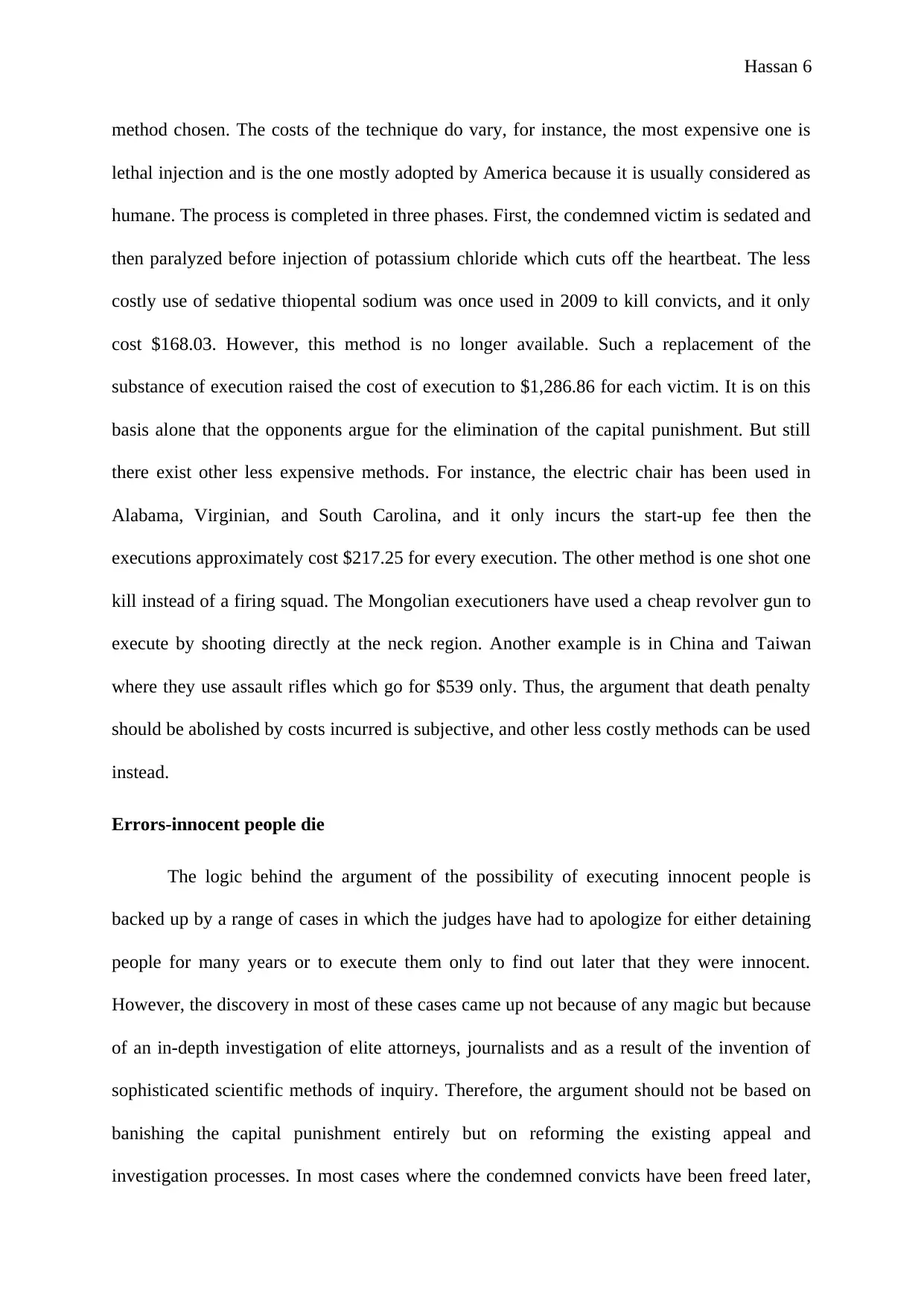
Hassan 6
method chosen. The costs of the technique do vary, for instance, the most expensive one is
lethal injection and is the one mostly adopted by America because it is usually considered as
humane. The process is completed in three phases. First, the condemned victim is sedated and
then paralyzed before injection of potassium chloride which cuts off the heartbeat. The less
costly use of sedative thiopental sodium was once used in 2009 to kill convicts, and it only
cost $168.03. However, this method is no longer available. Such a replacement of the
substance of execution raised the cost of execution to $1,286.86 for each victim. It is on this
basis alone that the opponents argue for the elimination of the capital punishment. But still
there exist other less expensive methods. For instance, the electric chair has been used in
Alabama, Virginian, and South Carolina, and it only incurs the start-up fee then the
executions approximately cost $217.25 for every execution. The other method is one shot one
kill instead of a firing squad. The Mongolian executioners have used a cheap revolver gun to
execute by shooting directly at the neck region. Another example is in China and Taiwan
where they use assault rifles which go for $539 only. Thus, the argument that death penalty
should be abolished by costs incurred is subjective, and other less costly methods can be used
instead.
Errors-innocent people die
The logic behind the argument of the possibility of executing innocent people is
backed up by a range of cases in which the judges have had to apologize for either detaining
people for many years or to execute them only to find out later that they were innocent.
However, the discovery in most of these cases came up not because of any magic but because
of an in-depth investigation of elite attorneys, journalists and as a result of the invention of
sophisticated scientific methods of inquiry. Therefore, the argument should not be based on
banishing the capital punishment entirely but on reforming the existing appeal and
investigation processes. In most cases where the condemned convicts have been freed later,
method chosen. The costs of the technique do vary, for instance, the most expensive one is
lethal injection and is the one mostly adopted by America because it is usually considered as
humane. The process is completed in three phases. First, the condemned victim is sedated and
then paralyzed before injection of potassium chloride which cuts off the heartbeat. The less
costly use of sedative thiopental sodium was once used in 2009 to kill convicts, and it only
cost $168.03. However, this method is no longer available. Such a replacement of the
substance of execution raised the cost of execution to $1,286.86 for each victim. It is on this
basis alone that the opponents argue for the elimination of the capital punishment. But still
there exist other less expensive methods. For instance, the electric chair has been used in
Alabama, Virginian, and South Carolina, and it only incurs the start-up fee then the
executions approximately cost $217.25 for every execution. The other method is one shot one
kill instead of a firing squad. The Mongolian executioners have used a cheap revolver gun to
execute by shooting directly at the neck region. Another example is in China and Taiwan
where they use assault rifles which go for $539 only. Thus, the argument that death penalty
should be abolished by costs incurred is subjective, and other less costly methods can be used
instead.
Errors-innocent people die
The logic behind the argument of the possibility of executing innocent people is
backed up by a range of cases in which the judges have had to apologize for either detaining
people for many years or to execute them only to find out later that they were innocent.
However, the discovery in most of these cases came up not because of any magic but because
of an in-depth investigation of elite attorneys, journalists and as a result of the invention of
sophisticated scientific methods of inquiry. Therefore, the argument should not be based on
banishing the capital punishment entirely but on reforming the existing appeal and
investigation processes. In most cases where the condemned convicts have been freed later,
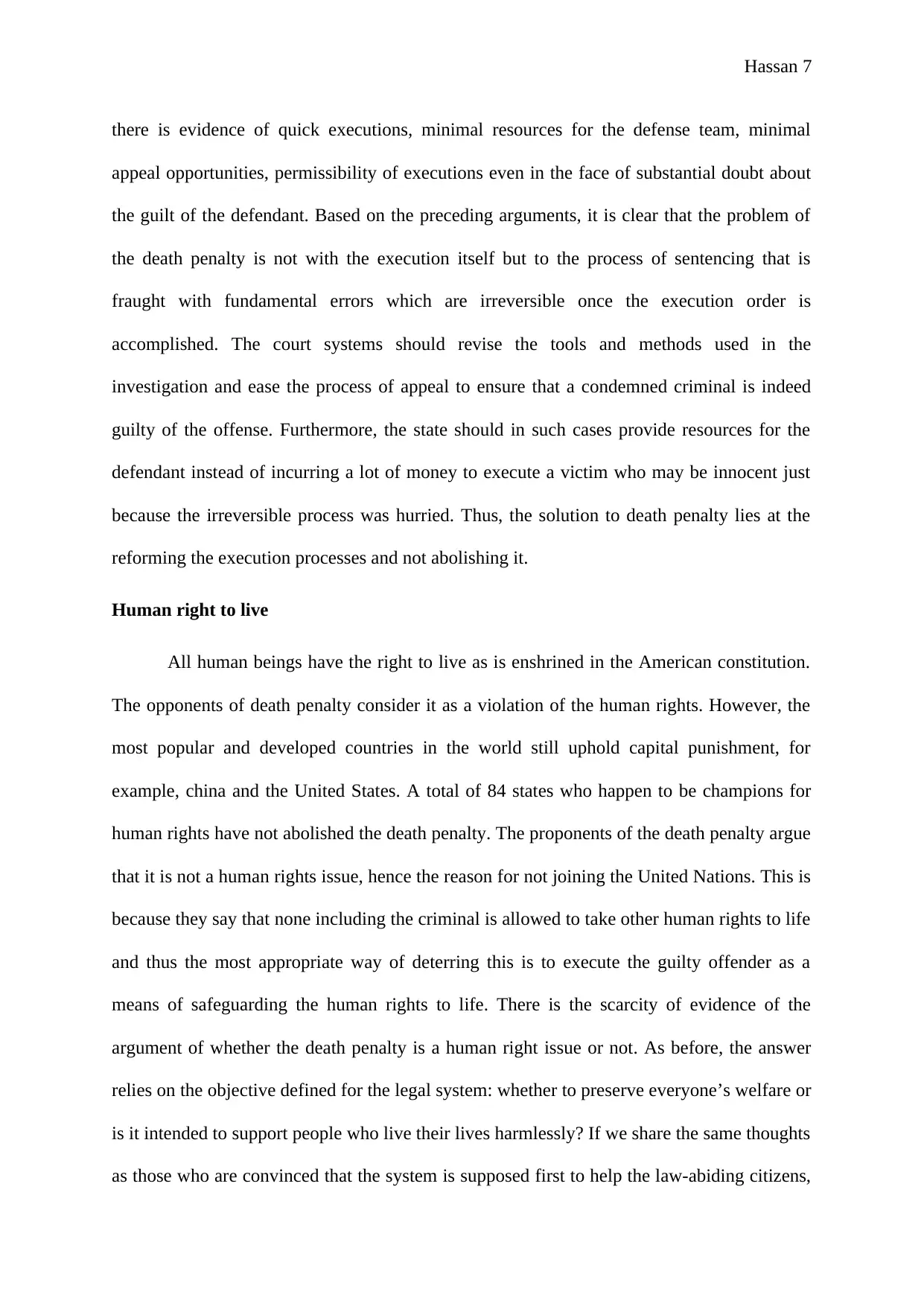
Hassan 7
there is evidence of quick executions, minimal resources for the defense team, minimal
appeal opportunities, permissibility of executions even in the face of substantial doubt about
the guilt of the defendant. Based on the preceding arguments, it is clear that the problem of
the death penalty is not with the execution itself but to the process of sentencing that is
fraught with fundamental errors which are irreversible once the execution order is
accomplished. The court systems should revise the tools and methods used in the
investigation and ease the process of appeal to ensure that a condemned criminal is indeed
guilty of the offense. Furthermore, the state should in such cases provide resources for the
defendant instead of incurring a lot of money to execute a victim who may be innocent just
because the irreversible process was hurried. Thus, the solution to death penalty lies at the
reforming the execution processes and not abolishing it.
Human right to live
All human beings have the right to live as is enshrined in the American constitution.
The opponents of death penalty consider it as a violation of the human rights. However, the
most popular and developed countries in the world still uphold capital punishment, for
example, china and the United States. A total of 84 states who happen to be champions for
human rights have not abolished the death penalty. The proponents of the death penalty argue
that it is not a human rights issue, hence the reason for not joining the United Nations. This is
because they say that none including the criminal is allowed to take other human rights to life
and thus the most appropriate way of deterring this is to execute the guilty offender as a
means of safeguarding the human rights to life. There is the scarcity of evidence of the
argument of whether the death penalty is a human right issue or not. As before, the answer
relies on the objective defined for the legal system: whether to preserve everyone’s welfare or
is it intended to support people who live their lives harmlessly? If we share the same thoughts
as those who are convinced that the system is supposed first to help the law-abiding citizens,
there is evidence of quick executions, minimal resources for the defense team, minimal
appeal opportunities, permissibility of executions even in the face of substantial doubt about
the guilt of the defendant. Based on the preceding arguments, it is clear that the problem of
the death penalty is not with the execution itself but to the process of sentencing that is
fraught with fundamental errors which are irreversible once the execution order is
accomplished. The court systems should revise the tools and methods used in the
investigation and ease the process of appeal to ensure that a condemned criminal is indeed
guilty of the offense. Furthermore, the state should in such cases provide resources for the
defendant instead of incurring a lot of money to execute a victim who may be innocent just
because the irreversible process was hurried. Thus, the solution to death penalty lies at the
reforming the execution processes and not abolishing it.
Human right to live
All human beings have the right to live as is enshrined in the American constitution.
The opponents of death penalty consider it as a violation of the human rights. However, the
most popular and developed countries in the world still uphold capital punishment, for
example, china and the United States. A total of 84 states who happen to be champions for
human rights have not abolished the death penalty. The proponents of the death penalty argue
that it is not a human rights issue, hence the reason for not joining the United Nations. This is
because they say that none including the criminal is allowed to take other human rights to life
and thus the most appropriate way of deterring this is to execute the guilty offender as a
means of safeguarding the human rights to life. There is the scarcity of evidence of the
argument of whether the death penalty is a human right issue or not. As before, the answer
relies on the objective defined for the legal system: whether to preserve everyone’s welfare or
is it intended to support people who live their lives harmlessly? If we share the same thoughts
as those who are convinced that the system is supposed first to help the law-abiding citizens,
Paraphrase This Document
Need a fresh take? Get an instant paraphrase of this document with our AI Paraphraser
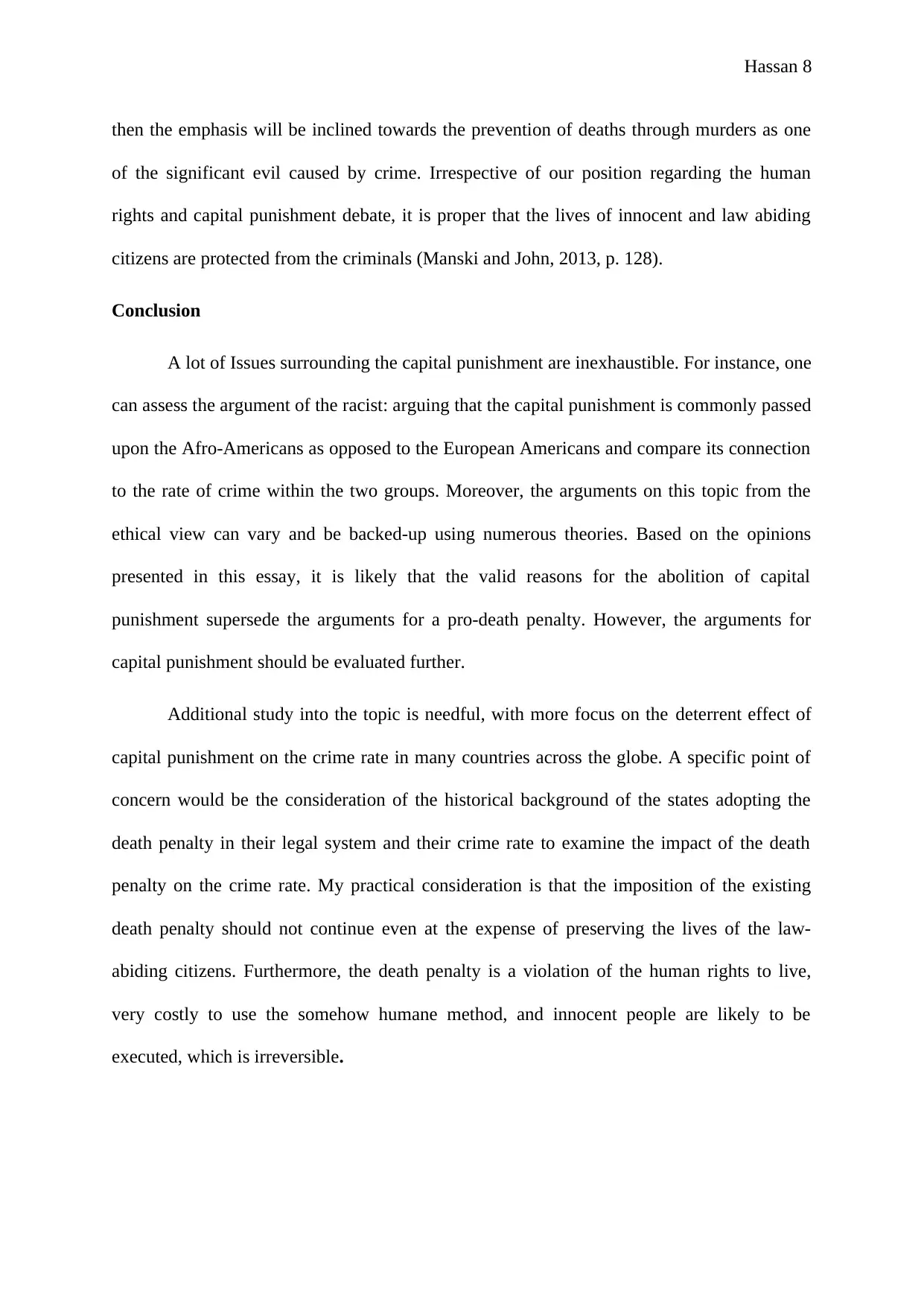
Hassan 8
then the emphasis will be inclined towards the prevention of deaths through murders as one
of the significant evil caused by crime. Irrespective of our position regarding the human
rights and capital punishment debate, it is proper that the lives of innocent and law abiding
citizens are protected from the criminals (Manski and John, 2013, p. 128).
Conclusion
A lot of Issues surrounding the capital punishment are inexhaustible. For instance, one
can assess the argument of the racist: arguing that the capital punishment is commonly passed
upon the Afro-Americans as opposed to the European Americans and compare its connection
to the rate of crime within the two groups. Moreover, the arguments on this topic from the
ethical view can vary and be backed-up using numerous theories. Based on the opinions
presented in this essay, it is likely that the valid reasons for the abolition of capital
punishment supersede the arguments for a pro-death penalty. However, the arguments for
capital punishment should be evaluated further.
Additional study into the topic is needful, with more focus on the deterrent effect of
capital punishment on the crime rate in many countries across the globe. A specific point of
concern would be the consideration of the historical background of the states adopting the
death penalty in their legal system and their crime rate to examine the impact of the death
penalty on the crime rate. My practical consideration is that the imposition of the existing
death penalty should not continue even at the expense of preserving the lives of the law-
abiding citizens. Furthermore, the death penalty is a violation of the human rights to live,
very costly to use the somehow humane method, and innocent people are likely to be
executed, which is irreversible.
then the emphasis will be inclined towards the prevention of deaths through murders as one
of the significant evil caused by crime. Irrespective of our position regarding the human
rights and capital punishment debate, it is proper that the lives of innocent and law abiding
citizens are protected from the criminals (Manski and John, 2013, p. 128).
Conclusion
A lot of Issues surrounding the capital punishment are inexhaustible. For instance, one
can assess the argument of the racist: arguing that the capital punishment is commonly passed
upon the Afro-Americans as opposed to the European Americans and compare its connection
to the rate of crime within the two groups. Moreover, the arguments on this topic from the
ethical view can vary and be backed-up using numerous theories. Based on the opinions
presented in this essay, it is likely that the valid reasons for the abolition of capital
punishment supersede the arguments for a pro-death penalty. However, the arguments for
capital punishment should be evaluated further.
Additional study into the topic is needful, with more focus on the deterrent effect of
capital punishment on the crime rate in many countries across the globe. A specific point of
concern would be the consideration of the historical background of the states adopting the
death penalty in their legal system and their crime rate to examine the impact of the death
penalty on the crime rate. My practical consideration is that the imposition of the existing
death penalty should not continue even at the expense of preserving the lives of the law-
abiding citizens. Furthermore, the death penalty is a violation of the human rights to live,
very costly to use the somehow humane method, and innocent people are likely to be
executed, which is irreversible.
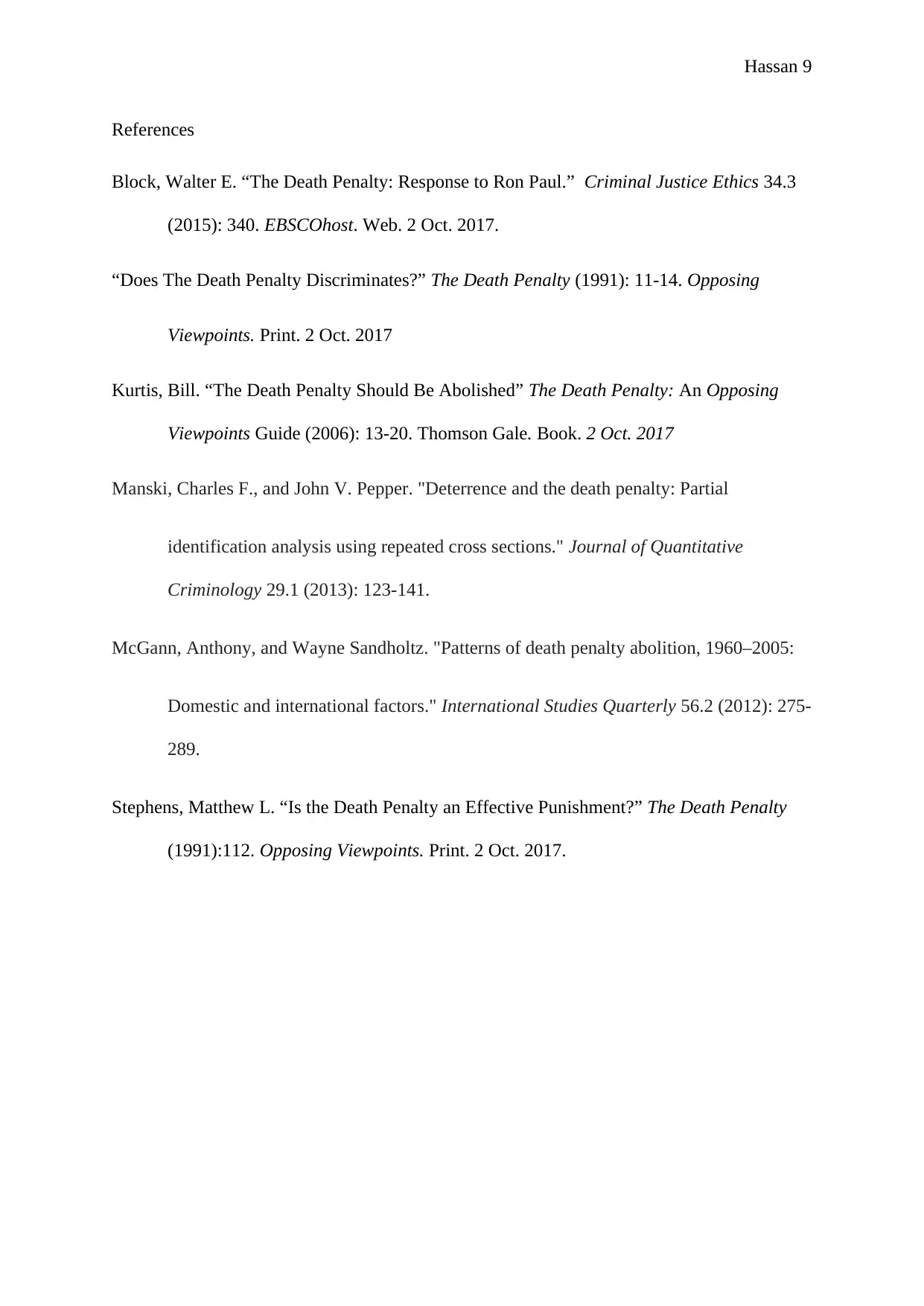
Hassan 9
References
Block, Walter E. “The Death Penalty: Response to Ron Paul.” Criminal Justice Ethics 34.3
(2015): 340. EBSCOhost. Web. 2 Oct. 2017.
“Does The Death Penalty Discriminates?” The Death Penalty (1991): 11-14. Opposing
Viewpoints. Print. 2 Oct. 2017
Kurtis, Bill. “The Death Penalty Should Be Abolished” The Death Penalty: An Opposing
Viewpoints Guide (2006): 13-20. Thomson Gale. Book. 2 Oct. 2017
Manski, Charles F., and John V. Pepper. "Deterrence and the death penalty: Partial
identification analysis using repeated cross sections." Journal of Quantitative
Criminology 29.1 (2013): 123-141.
McGann, Anthony, and Wayne Sandholtz. "Patterns of death penalty abolition, 1960–2005:
Domestic and international factors." International Studies Quarterly 56.2 (2012): 275-
289.
Stephens, Matthew L. “Is the Death Penalty an Effective Punishment?” The Death Penalty
(1991):112. Opposing Viewpoints. Print. 2 Oct. 2017.
References
Block, Walter E. “The Death Penalty: Response to Ron Paul.” Criminal Justice Ethics 34.3
(2015): 340. EBSCOhost. Web. 2 Oct. 2017.
“Does The Death Penalty Discriminates?” The Death Penalty (1991): 11-14. Opposing
Viewpoints. Print. 2 Oct. 2017
Kurtis, Bill. “The Death Penalty Should Be Abolished” The Death Penalty: An Opposing
Viewpoints Guide (2006): 13-20. Thomson Gale. Book. 2 Oct. 2017
Manski, Charles F., and John V. Pepper. "Deterrence and the death penalty: Partial
identification analysis using repeated cross sections." Journal of Quantitative
Criminology 29.1 (2013): 123-141.
McGann, Anthony, and Wayne Sandholtz. "Patterns of death penalty abolition, 1960–2005:
Domestic and international factors." International Studies Quarterly 56.2 (2012): 275-
289.
Stephens, Matthew L. “Is the Death Penalty an Effective Punishment?” The Death Penalty
(1991):112. Opposing Viewpoints. Print. 2 Oct. 2017.
1 out of 9
Related Documents
Your All-in-One AI-Powered Toolkit for Academic Success.
+13062052269
info@desklib.com
Available 24*7 on WhatsApp / Email
![[object Object]](/_next/static/media/star-bottom.7253800d.svg)
Unlock your academic potential
© 2024 | Zucol Services PVT LTD | All rights reserved.





